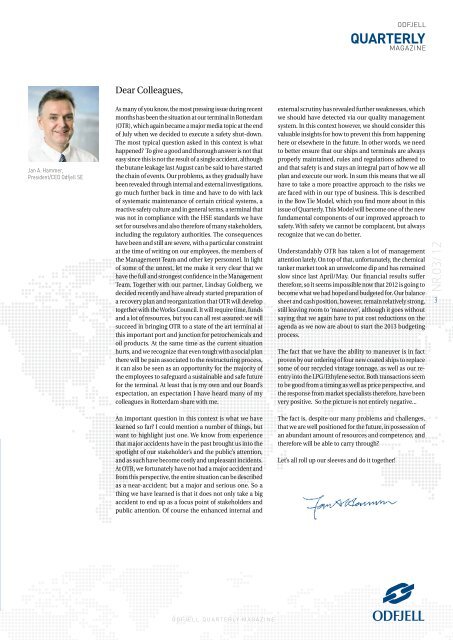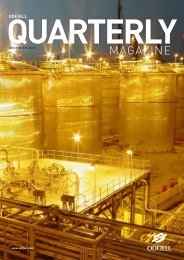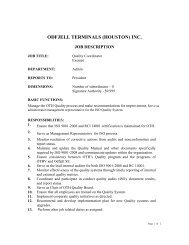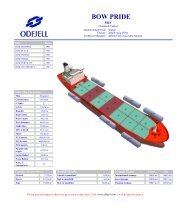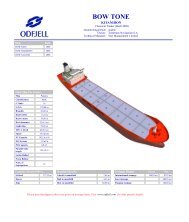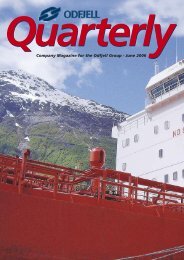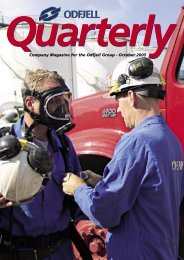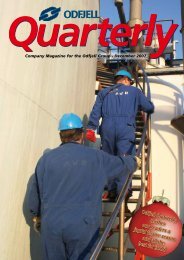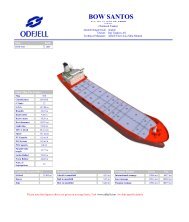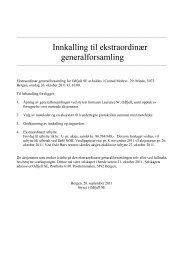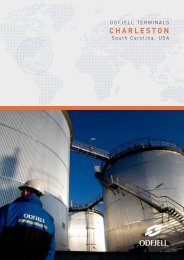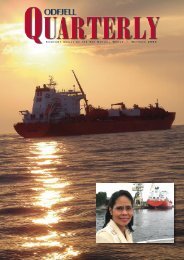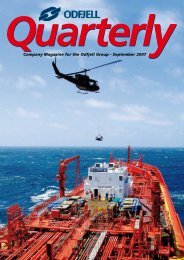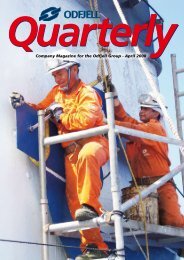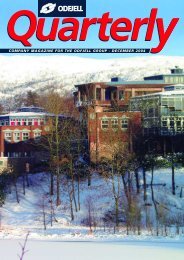Odfjell Quarterly October 2012
Odfjell Quarterly October 2012
Odfjell Quarterly October 2012
- No tags were found...
Create successful ePaper yourself
Turn your PDF publications into a flip-book with our unique Google optimized e-Paper software.
ODFJELLQUARTERLYmagazineJan A. Hammer,President/CEO <strong>Odfjell</strong> SEDear Colleagues,As many of you know, the most pressing issue during recentmonths has been the situation at our terminal in Rotterdam(OTR), which again became a major media topic at the endof July when we decided to execute a safety shut-down.The most typical question asked in this context is whathappened? To give a good and thorough answer is not thateasy since this is not the result of a single accident, althoughthe butane leakage last August can be said to have startedthe chain of events. Our problems, as they gradually havebeen revealed through internal and external investigations,go much further back in time and have to do with lackof systematic maintenance of certain critical systems, areactive safety culture and in general terms, a terminal thatwas not in compliance with the HSE standards we haveset for ourselves and also therefore of many stakeholders,including the regulatory authorities. The consequenceshave been and still are severe, with a particular constraintat the time of writing on our employees, the members ofthe Management Team and other key personnel. In lightof some of the unrest, let me make it very clear that wehave the full and strongest confidence in the ManagementTeam. Together with our partner, Lindsay Goldberg, wedecided recently and have already started preparation ofa recovery plan and reorganization that OTR will developtogether with the Works Council. It will require time, fundsand a lot of resources, but you can all rest assured: we willsucceed in bringing OTR to a state of the art terminal atthis important port and junction for petrochemicals andoil products. At the same time as the current situationhurts, and we recognize that even tough with a social planthere will be pain associated to the restructuring process,it can also be seen as an opportunity for the majority ofthe employees to safeguard a sustainable and safe futurefor the terminal. At least that is my own and our Board’sexpectation, an expectation I have heard many of mycolleagues in Rotterdam share with me.An important question in this context is what we havelearned so far? I could mention a number of things, butwant to highlight just one. We know from experiencethat major accidents have in the past brought us into thespotlight of our stakeholder’s and the public’s attention,and as such have become costly and unpleasant incidents.At OTR, we fortunately have not had a major accident andfrom this perspective, the entire situation can be describedas a near-accident; but a major and serious one. So athing we have learned is that it does not only take a bigaccident to end up as a focus point of stakeholders andpublic attention. Of course the enhanced internal andexternal scrutiny has revealed further weaknesses, whichwe should have detected via our quality managementsystem. In this context however, we should consider thisvaluable insights for how to prevent this from happeninghere or elsewhere in the future. In other words, we needto better ensure that our ships and terminals are alwaysproperly maintained, rules and regulations adhered toand that safety is and stays an integral part of how we allplan and execute our work. In sum this means that we allhave to take a more proactive approach to the risks weare faced with in our type of business. This is describedin the Bow Tie Model, which you find more about in thisissue of <strong>Quarterly</strong>. This Model will become one of the newfundamental components of our improved approach tosafety. With safety we cannot be complacent, but alwaysrecognize that we can do better.Understandably OTR has taken a lot of managementattention lately. On top of that, unfortunately, the chemicaltanker market took an unwelcome dip and has remainedslow since last April/May. Our financial results suffertherefore, so it seems impossible now that <strong>2012</strong> is going tobecome what we had hoped and budgeted for. Our balancesheet and cash position, however, remain relatively strong,still leaving room to ‘maneuver’, although it goes withoutsaying that we again have to put cost reductions on theagenda as we now are about to start the 2013 budgetingprocess.The fact that we have the ability to maneuver is in factproven by our ordering of four new coated ships to replacesome of our recycled vintage tonnage, as well as our reentryinto the LPG/Ethylene sector. Both transactions seemto be good from a timing as well as price perspective, andthe response from market specialists therefore, have beenvery positive. So the picture is not entirely negative...The fact is, despite our many problems and challenges,that we are well positioned for the future, in possession ofan abundant amount of resources and competence, andtherefore will be able to carry through?Let’s all roll up our sleeves and do it together!NR.03/ 123odfjell quarterly magazine


